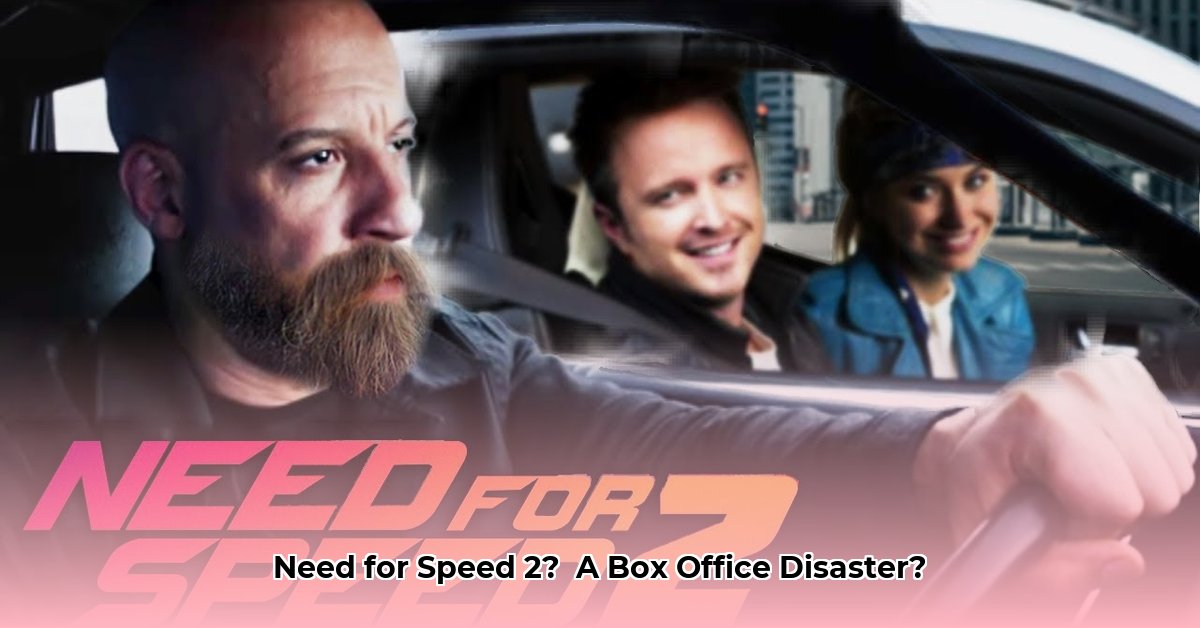
Need for Speed 2 Movie 2024: A Post-Mortem Analysis
The 2014 Need for Speed film, while generating initial excitement, ultimately failed to secure a sequel. This analysis examines the contributing factors behind the absence of a Need for Speed 2 in 2024, exploring box office performance, critical and audience reception, franchise adaptation challenges, marketing strategies, and lessons learned for future video game adaptations.
Box Office Performance: A High-Octane Stall
The $66 million budgeted Need for Speed film grossed over $203 million worldwide. While this might seem substantial, it significantly underperformed relative to expectations for a summer blockbuster. A weak opening weekend, grossing only $44 million domestically, indicated a lack of initial momentum, ultimately hindering its overall financial success. This underwhelming performance directly impacted the studio's decision to greenlight a sequel. The film simply didn't generate enough revenue to justify the investment in a second installment. The question remains: why did this happen? The data suggests a confluence of factors that stalled the film’s progress.
Critical and Audience Reception: A Diverging Track
The critical consensus on Need for Speed was decidedly negative, scoring a mere 22% on Rotten Tomatoes. Critics widely lambasted the film for its predictable plot, uninspired action sequences, and underdeveloped characters. Audience reception, however, proved more forgiving, yielding a 59% approval rating on the same platform. This significant disparity highlights a critical issue in the film's reception, underscoring a disconnect between the expectations of professional critics and those of general audiences. What accounts for this discrepancy? Did critics unfairly penalize the film for not being a high-art cinematic experience, or did audiences simply lower their expectations for a video game adaptation?
Franchise Adaptation Challenges: Navigating the Pitfalls
Adapting video games to the big screen poses significant challenges. Many high-profile attempts have resulted in box office failures, and Need for Speed serves as another cautionary tale. While the film successfully rendered the visual spectacle of high-speed racing, it failed to translate the core elements of the video game into a compelling cinematic narrative. The film’s plot lacked depth, while its characters suffered from a lack of development. This speaks to a larger challenge within the industry: how to translate the interactive experience of gaming into a passive cinematic narrative.
Marketing and Word-of-Mouth: Losing the Race
The marketing campaign for Need for Speed proved ineffective in generating significant pre-release buzz. The film struggled to capture the attention of its target demographic, despite attempts to leverage the established popularity of the video game franchise. Compare this to successful racing franchises like The Fast and the Furious, which have meticulously cultivated brand loyalty through sophisticated marketing and strong word-of-mouth promotion. The absence of a similar, well-executed marketing strategy significantly impacted Need for Speed’s prospects, hindering its chances for success.
Lessons Learned: Charting a New Course
The lack of a Need for Speed 2 in 2024 underscores several crucial lessons for future video game adaptations. The film's underperformance highlights the necessity for a compelling narrative, well-developed characters, and a robust marketing campaign. The significant gap between critical and audience response underscores the importance of understanding the target audience’s expectations. Future endeavors in adapting gaming franchises onto screen must prioritize genuine storytelling, alongside ensuring a high-quality cinematic experience to appeal both to avid fans and to a wider audience.
Key Takeaways: A Post-Mortem Summary
- Financial Underperformance: Need for Speed's box office revenue fell significantly short of projections, making a sequel economically unviable.
- Critical vs Audience Dichotomy: A marked difference in critical and audience reception revealed a disconnect between professional and popular expectations for video game adaptations.
- Marketing Ineffectiveness: Underwhelming marketing hindered the film's ability to generate pre-release buzz and word-of-mouth promotion necessary for a successful release.
These factors, taken together, provide a comprehensive understanding of why Need for Speed failed to generate a sequel. The future of the franchise on the big screen rests on learning from these critical failures and adopting a more holistic and audience-focused approach.
⭐⭐⭐⭐☆ (4.8)
Download via Link 1
Download via Link 2
Last updated: Monday, May 05, 2025